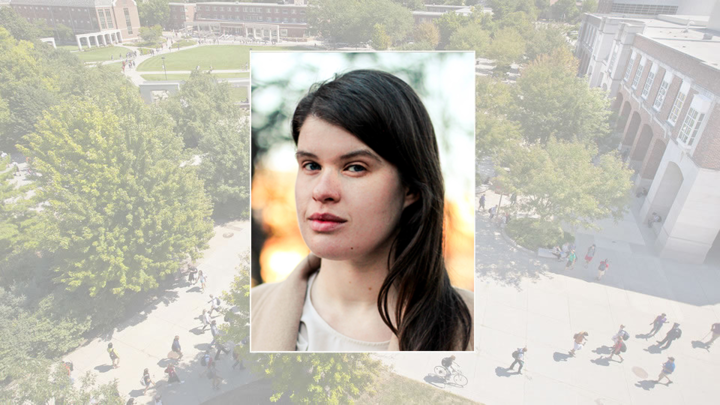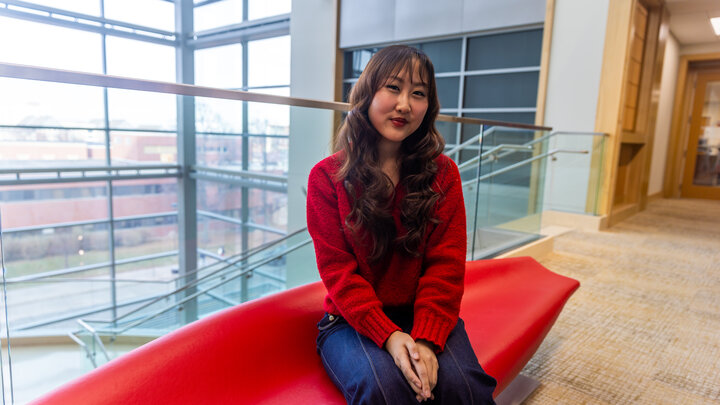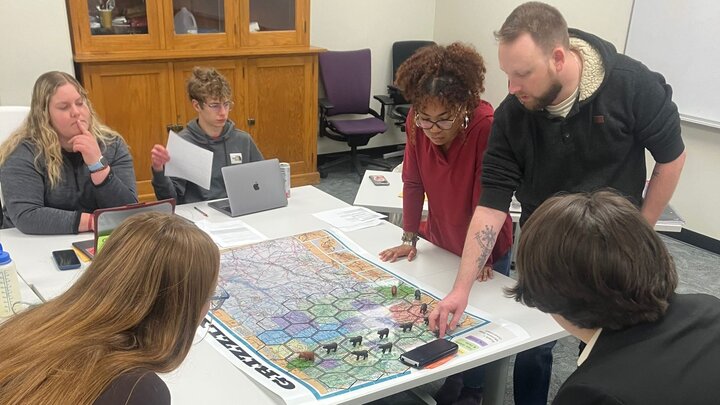Courses you are teaching this year
This fall, I'm teaching three courses. Introduction to Global Studies is exactly what it sounds like. Human Rights in a Global Context is an introductory course designed to introduce students to the field of human rights and to human rights issues around the world.
Refugees, Displaced Persons, and (Im)migrants in a Globalized World is a 300-level seminar exploring migration, especially forced migration, and how it changes the global order, individual lives, and just about everything else in between. I'm also helping to teach the service-learning capstone in the Human Rights and Humanitarian Affairs minor, which involves setting up students with internships.
What is your favorite course to teach and why?
I'm in the exhilarating position of teaching all brand new courses this semester—one is just brand new for me, but two of them (Human Rights in a Global Context and Refugees, Displaced Persons, and (Im)migrants in a Globalized World) are actually brand new. It's a bit premature for me to select a favorite, but I will say I'm very exciting about Refugees, Displaced Persons, and (Im)migrants in a Globalized World. Not only is the course material vital and impactful, but migration is a topic that enables a completely interdisciplinary approach, which to me is incredibly exciting. In that course, the students and I will be exploring work on migration from a vast array of writers, from political theorists to public health experts publishing in premier medical journals, to just about everyone else in between. I'm also very inspired by the way that an examination of migration demands that we look both at broad, systemic, abstract factors, like the way we organize political communities worldwide, and also, simultaneously, that we witness and deeply contemplate the experiences of individuals in our communities.
How and/or why did you choose this field?
The people who have known me longest joke that I was never really going to do anything else. Ever since I was a very young child, I was deeply interested in every detail of how people in different cultures lived. When I got a little older, the reason I was most often in trouble with my parents was for absconding with their newspapers and news magazines—I have just always loved learning what is happening around the world, and especially what is happening politically.
Nothing in my family or background connected me especially to these issues; it was just a random spark. I was extremely lucky to be able to start traveling on education abroad opportunities when I was in high school, and I went to college with the idea of becoming a humanitarian aid worker.
After college, I spent a year living a remote outer atoll of the Marshall Islands, teaching English and helping with a few community development initiatives. During that year, I realized that the only really remarkable skillset I had when it came to humanitarian work was being able to understand what was going on just beneath the surface politically on my tiny island, and being able to effectively explain it to people who weren't directly experiencing it. Due to this, I thought getting my doctorate would be an important way for me to hone those skills and find a career where I could use them in service of others. So, I got my doctorate, and here I am.
What are you currently researching?
Currently, I'm working on polishing up a long-standing project on how international human rights institutions—and especially international criminal tribunals-- affect the way that leaders choose to fight wars and negotiate peace. I am also very interested in why and how people choose to mobilize to defend their human rights, even in the face of great personal risk. I have been watching the development of protest movements around the world very closely, and mulling over several research ideas.
What are some ways students can be involved in your research?
If you are interested in any of the topics stated above, reach out to me at jreilly3@unl.edu. I truly love talking to people about these topics, so if you have a particular interest in the effects (especially unintended consequences) of international human rights institutions, or in protest movements, and why people join them even when there could be dire consequences, shoot me a quick e-mail and we can find time to talk and explore what's possible.
Why should students major in your field?
We are all global citizens, whether we choose to exercise this citizenship or not. Further, by virtue of living in this place, at this time (although it might not feel like it at this particular pandemic moment), we are empowered in ways that few humans have ever been—the resources we have to inform ourselves and connect ourselves with others means that we have vast opportunities to exercise our agency as global citizens. More importantly, and more concretely, if we cultivate the skills to effectively exercise our agency as global citizens, we can not only improve our own lives by opening ourselves to more and better opportunities, we can create a better world for ourselves and others. A major and minor in Global Studies is carefully designed to give you the tools to skillfully and intentionally be a global citizen, by helping you cultivate an understanding of the simultaneously intimate and immense ways globalization affects our lives and exposing you to the knowledge and skills you need to create fruitful relationships across cultures. We also put the "rubber" of the skills you develop into the classroom to the "road" of your professional development by structuring career-building work into your coursework, and creating many opportunities for you to explore career options and beginning setting yourself up for an enriching, satisfying, globally-engaged post-UNL life.
What do you enjoy doing outside of work (hobbies, other interests)?
When I am not working, I spend most of my time on one of the following pursuits: staying physically active by cycling or practicing yoga, trying to learn Chinese, coaxing my cat to spend time with me, and trying new recipes.




